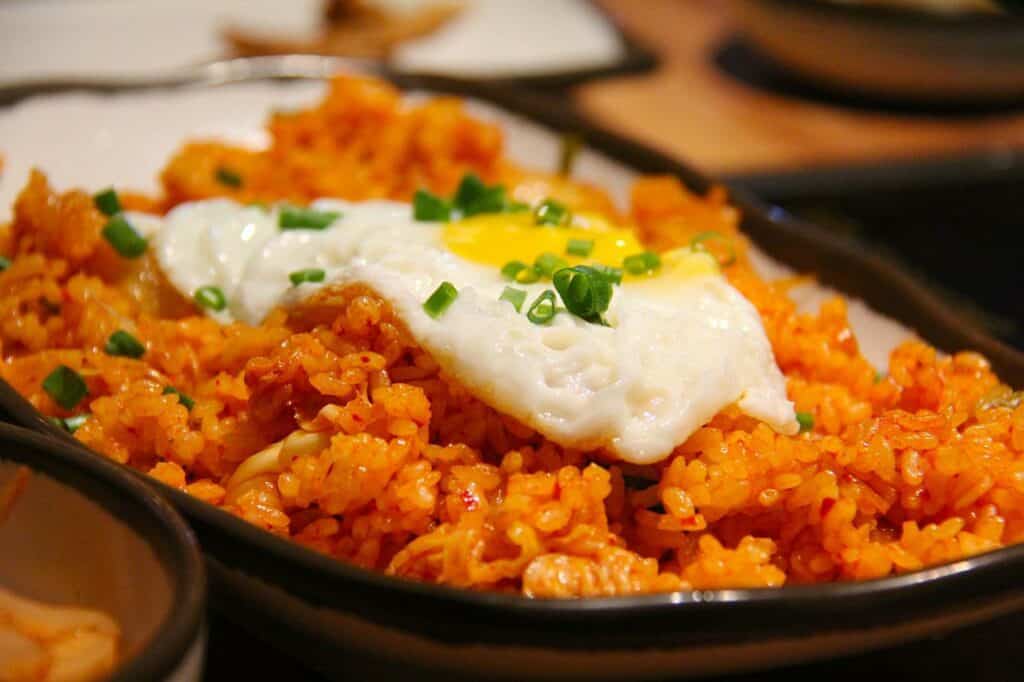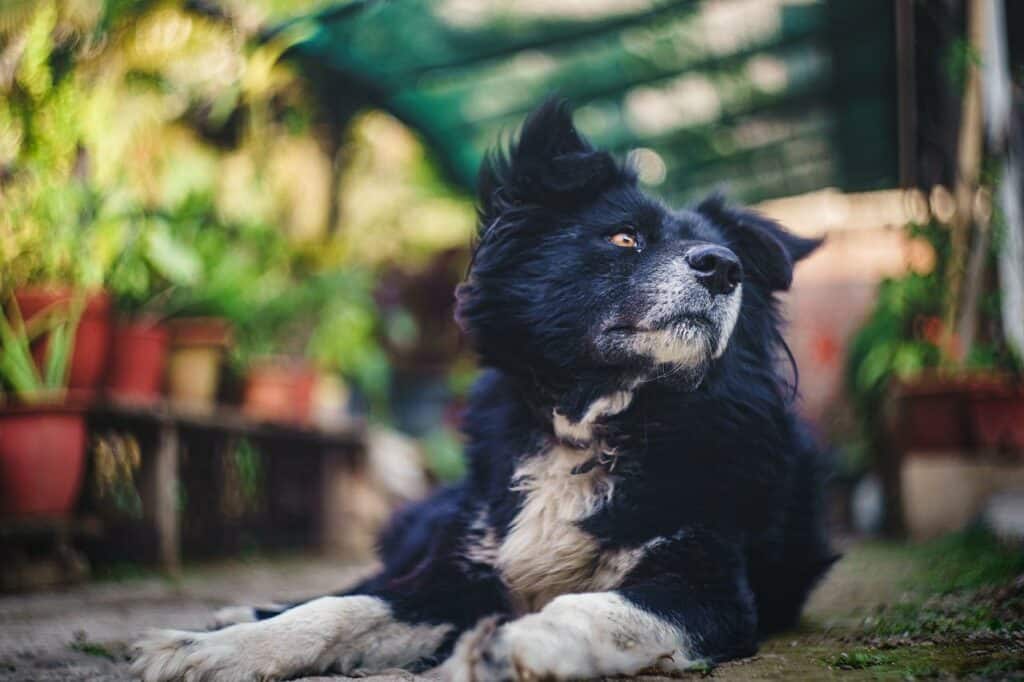Eggs and rice are a staple in every household’s pantry, and when mixed, they make a delicious meal.
You can enjoy eggs and rice at any time of the day, and your fur friend will be watching, waiting for a bite.
In such instances, if you find yourself at a crossroad on what to do, worry not, as we’ve got you covered.
So, can dogs eat eggs and rice?
Yes.
Eggs and rice are a highly nutritious food containing all the vitamins, essential minerals, proteins, and fatty acid goodness that your dog needs.
When you introduce eggs and rice into your dog’s diet, do it in moderation and watch out for any signs of a negative reaction.
This article will dive deep into important information on the health benefits, risks, and tips you need to know before feeding your furry friend eggs and rice.

Health benefits of rice and eggs for dogs
Here are some important health benefits provided for your dog:
Rice is low in fat, has no salt or cholesterol, and is easily digestible.
It also has probiotic actions that feed good bacteria found in the small intestines, which help your dog’s immune system stay healthy.
White rice is easier to digest and is ideal for dogs with gastrointestinal issues or diarrhea.
Brown rice has a high fiber content which stabilizes blood sugar in dogs.
The fiber also makes dogs feel fuller for long, aids in constipation, supports regular bowel movements, and improves digestion.
Wild rice is rich in vitamins D, B1, and B6, which support heart health, metabolism, and cell production in your dog.
Essential minerals such as calcium, phosphorus, and magnesium in wild rice support strong bones, teeth, and ligaments in dogs.
They also aid in muscle movement and energy production, and protect your dog against organisms that can damage cells.
The high protein in eggs has essential amino acids that contribute to your dog’s muscle development, tissue repair, a healthier and shinier coat, and improved skin.
Eggs are also a great source of vitamin A, riboflavin, folate, iron, selenium, and fatty acids.
Vitamin A aids in maintaining healthy eyes and skin and supports a healthy immune system in dogs.
It is also important in growing animals as it aids in forming organs and bone growth.
The riboflavin found in eggs supports digestion in dogs by aiding the enzymes in breaking down protein, carbohydrates, and fat, turning them into energy.
It also supports growth and repairs the DNA in dogs.
The iron in eggs supports the formation of red blood cells, boosts the oxygen supply, aids in healthy liver functioning, and increases energy and vitality in dogs.
Eggs are rich in selenium which prevents thyroid diseases, heart diseases, cancer, and cognitive deterioration.
The folate in eggs is necessary for the production of red blood cells.
It also aids in the production of nucleic cells like DNA.
If you own a pup, folate will support its rapid cell growth.
The egg yolks are full of fatty acids, which support cell growth, maintain healthy skin and coat, and maintain a strong immune system in dogs.
Risks of eggs and rice for dogs
Brown rice is hard to digest, and this will affect dogs with digestive problems by causing diarrhea or constipation.
White rice is a fast-burning carb that can raise the blood sugar levels in your dog.
High blood sugar levels in diabetic or overweight dogs will be dangerous.
Dogs with yeast infections will also be affected by high blood sugar levels.
If your dog eats too many eggs, it can cause weight gain due to the high protein content.
Weight gain will lead to complications such as diabetes or pancreatitis.
Your dog can have an allergic reaction to eggs and rice, so it will be wise to watch him closely if you introduce it to his first diet.
Common symptoms of allergic reaction to food include swelling of body parts, vomiting, diarrhea, itching, fever, and lethargy.

Ways of serving eggs with rice to your dog
Cooked eggs will be the best for your dog.
You can either boil, scramble or poach the egg.
Cooked eggs will prevent your dog from ingesting any bacteria that will be harmful to its health.
Don’t add any seasoning or excess salt to the eggs.
How to make eggs with rice for dogs
Ingredients
- One whisked egg
- A cup of cooked vegetables of your choice
- 1 cup cooked brown rice
Directions
- Step 1: First, cook the vegetables and brown rice together until tender.
- Step 2: When ready, put the vegetables and rice in a bowl and add the egg. Mix all of them well.
- Step 3: Scoop the mix into small rounded shapes and place them on a cookie sheet. Bake in a 350 oven for 12-15 minutes.
- Step 4: Once done, let them cool down then you can feed your dog directly.

How much eggs and rice is enough for my dog?
When unsure, always follow the 10 percent rule.
Eggs and rice shouldn’t make more than 10 percent of your dog’s daily calorie intake.
Give it once a week to monitor any adverse reaction that your dog has.
Add vegetables to the eggs and rice so that your dog can have a balanced diet that will be nutritious.
Can dogs eat raw eggs?
No.
Raw eggs are not safe for dogs.
When your dog ingests raw eggs, it’s at the risk of contracting salmonella, which causes stomach infection.
The signs of salmonella poisoning include fever, vomiting, diarrhea, and weakness.
Raw egg whites have a stimulant that hinders the absorption of vitamin B7 in the dog’s body, an essential vitamin that supports healthy skin and coat, while also aiding in digestion.
Raw eggs that have gone bad contain bacteria that will harm your dog when it ingests them.
What to consider before feeding your dog eggs and rice
Brown and wild rice will be the best as they contain many nutritious ingredients that will benefit your dog. If your dog has a digestive problem, opt for white rice.
Don’t feed your dog a lot of white rice as it can cause high blood sugar levels in the dog.
Avoid fried eggs as they have high fats, which will lead to stomach upset and weight gain in your dog.
Don’t add seasoning or salt to the eggs and rice you want to feed your dog.
Contact your vet immediately if your dog experiences an allergic reaction after eating the eggs and rice.
Moderation is key when it comes to eggs and rice.
Control the meal portions that you feed your dog and throw in some vegetables to ensure a well-balanced diet.
Frequently Asked Questions (FAQs)
Can dogs eat eggshells?
Yes, dogs can eat eggshells as they contain calcium, an essential mineral for dogs.
Before giving your dog eggshells, consider other options first, as its sharp edges can harm dogs.
Can dogs eat eggs every day?
No, dogs shouldn’t eat eggs every day as they can cause weight gain due to the high protein and fatty acids they contain.
To wrap up
Eggs and rice will be a good addition to your dog’s meal because of the high nutritional value they have.
Watch out for any allergic reaction, and keep the ingredients you mix in the eggs and rice for your dog simple.
A happy dog is a happy owner, so go ahead and introduce eggs and rice into your dog’s meals.
- What Dog Breeds Have Pink Skin? - March 24, 2023
- What Are the Most Inspiring Dog Breeding Quotes? - March 20, 2023
- Can Pheromone Spray Help Improve Dog Breeding Results? - March 19, 2023








